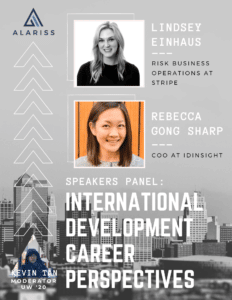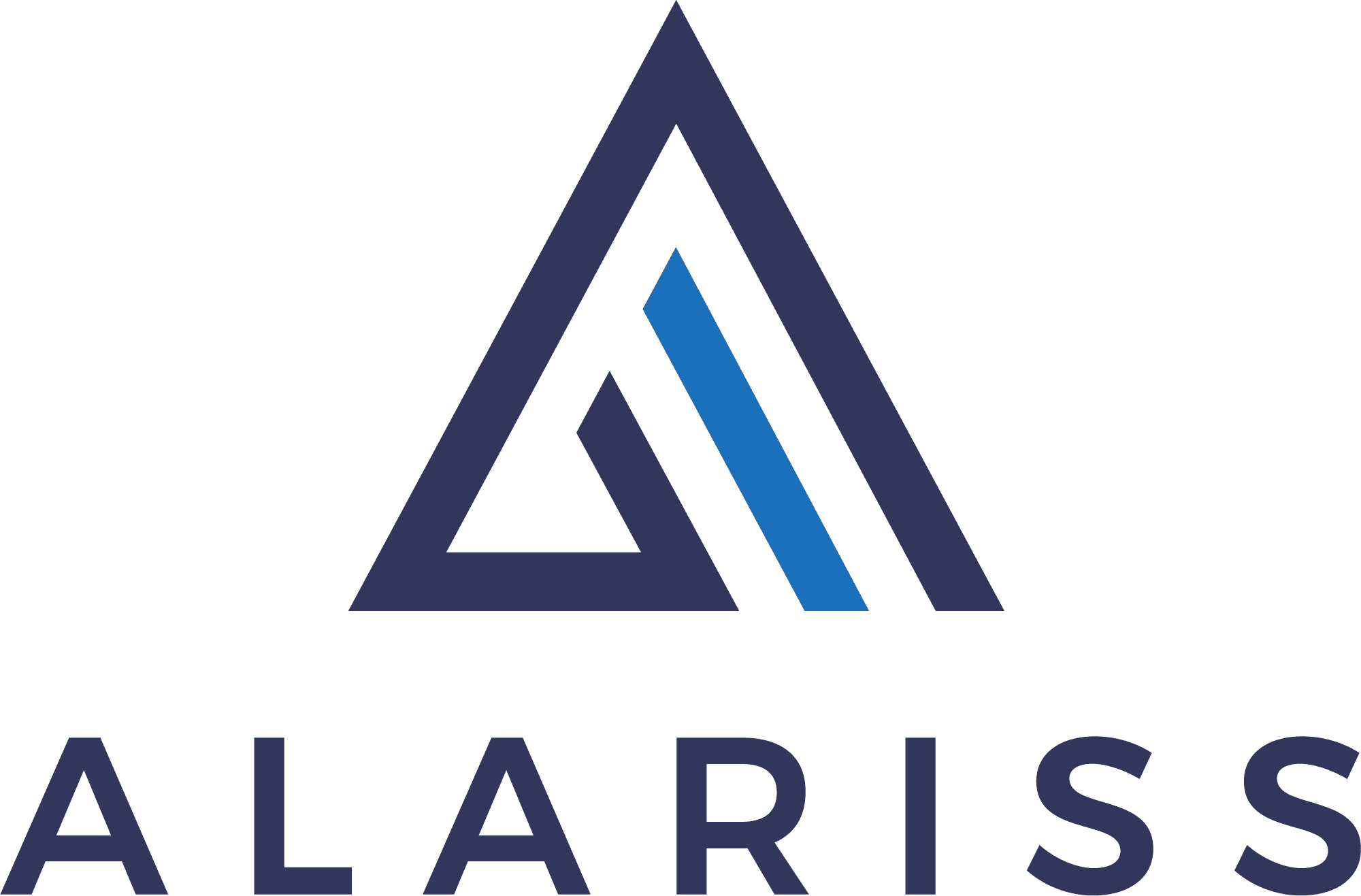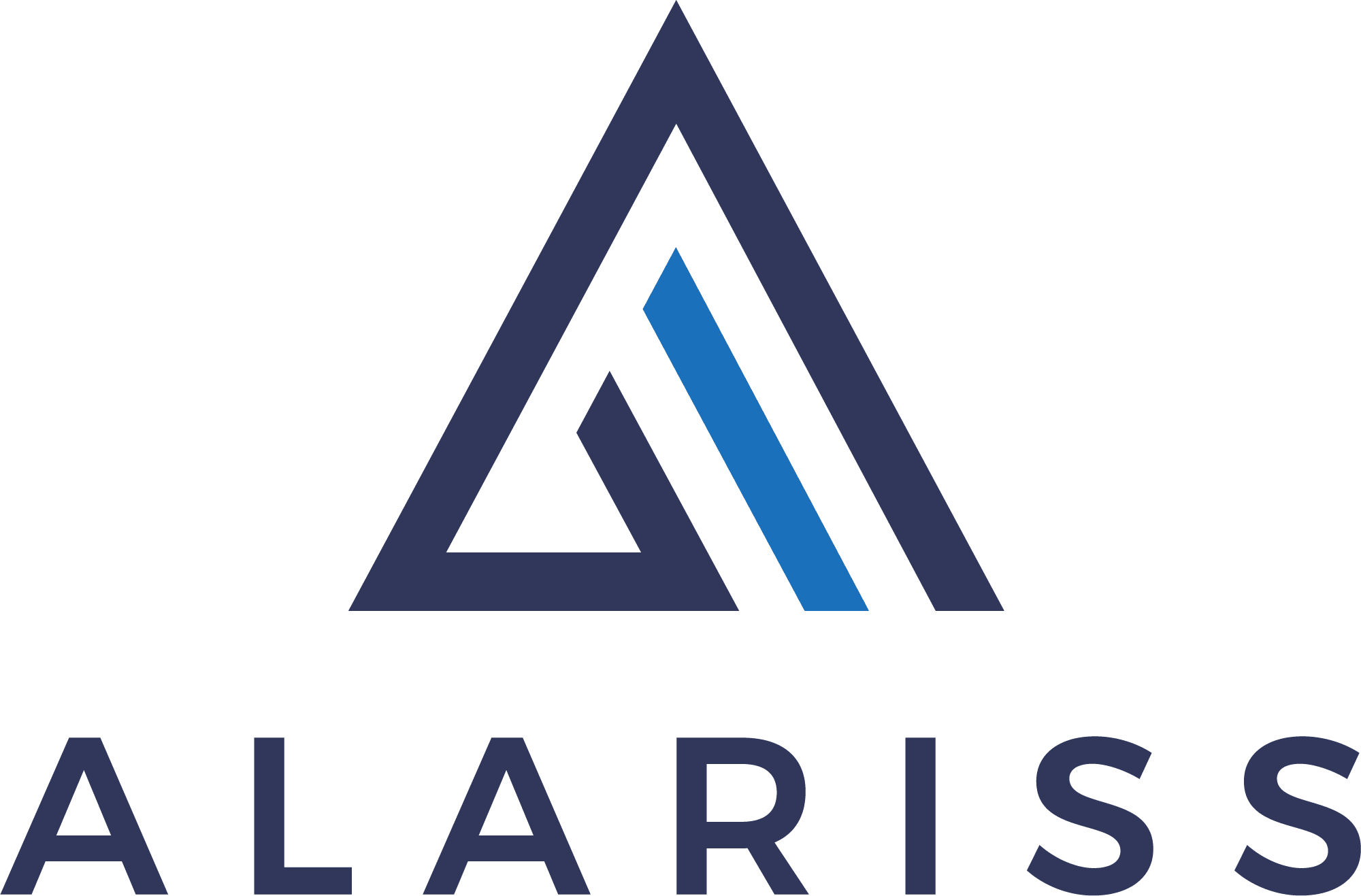Blog
A Career in International Development


By Sarah Yang
August 7, 2020
Earlier in June, Alariss Global had the wonderful opportunity to speak with Lindsey Einhaus, Risk Business Operations @ Stripe, and Rebecca (Becca) Gong Sharp, COO @ IDinsight. We sat down (virtually!) together as they touched on their self starting path to fintech, the globalization of business, and the secret to finding fulfilling work.
Lindsey Einhaus: Risk Business Operations at Stripe
Lindsey oversees scale and global expansion for Stripe’s growing suite of banking and financial products. Prior to Stripe, she worked in the financial data division of Kensho Technologies, a machine learning startup in Cambridge, MA that was acquired by S&P Global in 2018. Before this however, she was in the public sector working a variety of government jobs from Congress as a Legislative Aide for the U.S. Senator Patty Murray (D-MA) to the U.S. Treasury as an international economist in the Office of European Affairs. In addition to her public and private work, she also has experience serving in the Peace Corps in Ukraine. She holds an MPA from Princeton’s School of Public and International Affairs School and a BA in Philosophy and History from the University of Washington.
Rebecca (Becca) Gong Sharp: COO at IDinsight
Becca Gong Sharp is the Chief Operating Officer and a Partner at IDinsight, based in the US. Prior to joining IDinsight, Becca was a strategy consultant working for the Rockefeller Foundation and other large philanthropies. She has extensive experience in international development throughout Central Asia and East Africa, with specialties in impact evaluation, strategy consulting, behavioral economics, project design, and business development. Becca holds a bachelor’s degree with honors in Social Studies from Harvard University, an MBA from the Yale School of Management, and an MPA in international development from the Princeton School of Public and International Affairs School.
Road to Fintech
Seeing as you both studied humanities during undergrad, how did your backgrounds help you with finding a career in international development?
Lindsey: My philosophy and history degrees have been the most useful degrees I got out of college. It taught me to break down problems and build coherent arguments for one idea. Just learning how to do revenue streams and excel sheets wasn’t giving me the critical skills I needed because I wasn’t answering the question “why?” in the context of a broader society, but rather I found myself asking, “Why am I focused on this really small problem?”
My underlying goals have been the same since I was in college–growing the middle class in developing countries. Studying abroad helped me understand why the U.S is structured like the way it is, and I started to focus on how to build economic development through private sector growth rather than relying solely on charitable institutions, and how to start long term growth.
Becca: As for me, I come from an international background and so studying social studies revealed to me the inequity in opportunities that stem from social injustice. Opportunity became something that was only available to those who were privileged enough to access them. I became committed to doing something that would contribute to alleviating those circumstances.
Have you had any experience with mentors?
Lindsey: I’ve moved across many different industries and different geographies, and so keeping up with mentor relationships wasn’t super feasible during those times. Also, I found that the particular industries that I worked in (technology, treasury departments) were oftentimes male-dominated. Not to say that you can’t have male mentors, but as someone who identifies as a woman, it would’ve been helpful to connect with other women in the industry. However, despite the lack of mentors in my career journey, that doesn’t mean I don’t learn or admire the leaders in my workplace around me! I grew a lot from self-reflection— learning from my professional experiences and emulating the strengths of leaders I admired.
Becca: Every work experience you have is an opportunity to learn about leadership, and how to emulate those traits that you find admirable. Mentorship is not just going up to a person and asking them to be your mentor, but rather learning from your professional workspaces and experiences. It’s about learning from people’s mistakes, and emulating their strengths. With time, there are aspects of your leadership style that you adopt and adapt– I’ve definitely seen examples of leaders I want to be like, and leaders that I don’t want to be like.
In the same vein, it’s super important to cultivate meaningful connections and relationships! People who maintain their personal networks can often utilize them to get recommended for jobs, or recommend others for jobs. Having a wide, large network is really important.
How do you begin looking for international jobs/internships?
Becca: It’s all about connections! If you’re trying to aim for an internship in a particular country/region, start by building a network in that area. Connect with people that have worked there, people who’ve lived there– as undergrads, get out of your comfort and try to cultivate a wide network of peers! Cross register at grad schools to meet useful professional contacts– it’s more effective for networking to have access to people who already have some work experience.
Another factor to take into consideration is the language spoken in the countries that you’re interested in working in. It’s not as necessary in some countries, but if you want to build regional expertise and understand the deep-rooted problems in the community, it’s important to learn the professional language. Languages allow you to empathize and integrate with the community— there are also professional benefits that accompany going into a field where speaking the language is required.
Globalization of Business
What value does Fintech add to the world?
Lindsey: China’s efforts to build cryptocurrency that can replace the U.S. dollar as the global reserve currency is different from FinTech for companies like Stripe and Robinhood. Fintech is a way to democratize access to finance and capital in a way that hasn’t been seen before. Fintech is trying to break down a lot of traditional barriers that exist in the financial industry by democratizing what’s been unavailable or inaccessible to smaller domestic companies around the world such as capital raising, loans or personal investments. Stripe helps international businesses expand their customer base by giving entrepreneurs and merchants access to digital payments
The opportunity for digital payments are vast and Stripe wants to help fill that space. Only 3-4% of global commerce is online, so most businesses are cash-based. Furthermore, the transition to an online economy that would have taken place over the next 3-5 years has been accelerated and compressed into the past 3-5 months, and because of COVID-19 it’s beginning to happen in a much more compressed time frame. The post-COVID world will be affected by the types of jobs people will have when physical proximity is no longer a given.
Secret to Fulfilling Work
How do you find meaningful work?
Becca: Right out of college I, like many others, was very attached to the idea of working in a particular sector, or finding the particular mission or issue I wanted to contribute to. This was the main criteria upon which I would base professional decisions.
Now what has become most important for me when looking for a job or career is this: fundamentally knowing your own self and knowing your strengths. Then, you lean into those strengths to help you find a career that you’ll enjoy, and find fulfilling. Really focus on the actual work that you’ll be doing– what is the nature of your job? You can work at a climate change company, but what is it that you’ll be doing? Who are you and how can you, uniquely, best contribute to the mission? Are you the custodian, the financial analyst, or the president? The role that you take can matter just as much or more than the overall mission or statement of the company when it comes to personal fulfillment. Just reading the company’s statement won’t tell you anything about the nature of the work you’ll be doing on a daily basis.
How do you determine which jobs will be best suited for you? It’s really important to pay attention to what it is that you’re good at, and what aspects of work that you enjoy. A great way to do this is to be open to tons of different experiences, professional or not. Things like internships will be great opportunities to find out aspects of work you really like, and what you don’t like as much. Tune in to your own observations about what type of work gets you into “flow state” (where work feels like fun!), and also be sure to solicit others’ feedback about where you contribute best.
Once you do that, then the next step is to find a job that allows your strengths to shine. And the tricky part about this is that everyone has different strengths and weaknesses! Maybe the idea of sitting in a room by yourself for 7 hours thinking and theorizing about black holes might seem awful to you, but for someone else, that could be their paradise. Actively learning from your previous experiences and roles will help lead you to landing a job that doesn’t actually feel like work.




